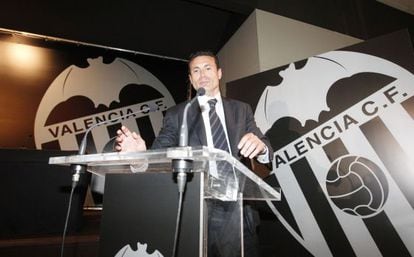Valencia soccer club for sale
Board seeks buyer for cash-strapped Primera side, but with a few conditions

Valencia CF is for sale. The president of the perennially indebted Primera División soccer side, Amadeo Salvo, announced as much in a shareholders meeting on Wednesday, albeit with several conditions. "For sale, yes," he said. "For 250 million euros that will serve to clear the club's debt; the buyer will have to retain the advisors at the club and, if the buyer leaves, a buy-back option must be allowed."
Furthermore, Salvo demanded any interested party should be dedicated to building a great side. "The sale of Valencia CF will be decided here; it will not be decided by Bankia or the regional government," Salvo said.
The Popular Party-led regional government is guarantor for the club's debt through the public Valencia Finance Institute, which is Valencia CF's main shareholder. Bankia, which was nationalized last year, is the club's main creditor, to the tune of 230 million euros. But despite this backing, the club has failed to find a financial exit door.
"Investment is needed to find an overall solution," Bankia said in a statement. "The most viable option is to find investors that can guarantee a good sporting, social and economic project." The question is which entity, Valencia CF or Bankia, holds legal authority to sell the club.
The club is on the market for €250 million to clear its considerable debts
Valencia is 354 million euros in debt, a reduction of 196 million compared to June 2009, when Bancaja, which was subsequently absorbed by Bankia, installed Manuel Llorente as club president. Last June, Salvo replaced Llorente and presented a budget of 87 million euros.
Valencia's decline began in 2004, shortly after it had won the European Supercup by beating José Mourinho's Porto, when the promoter Juan Soler assumed the presidency with the backing of former regional premier Francisco Camps (PP). In just four years under Soler, the club's debt skyrocketed to 550 million euros.
The club has struggled to contain its debts with simple formulas: the sale of its best players year after year - David Silva, David Villa, Juan Mata, Jordi Alba, Isco and Roberto Soldado among them - and a capital increase of 92 million euros, raised by a share issue to fans (18 million euros) and a 74-million-euro loan from Bancaja's foundation, which was guaranteed by the regional government.
On top of the 230 million Valencia owes Bankia, it also has a 25.6-million-euro debt with CaixaBank. Bertolín, the construction firm contracted to build the New Mestalla stadium, on which work has been halted since 2009, is owed 15 million euros. The club has already spent 164 million euros on the half-finished New Mestalla, and pays 12 million a year in interest on its loans. A further 90 million euros is needed to complete the stadium. "We are in talks to have the stadium built," Salvo said on Wednesday.
This season, Valencia has also been hit by the loss of what in recent years had been a regular income of 20 million euros a year from Champions League qualification. The club receives 48 million a year in television rights but Valencia's biggest worry is the 50-percent drop in revenues from club membership - a direct result of the devaluation of the team and worsening results. Salvo also believes the 14 to 15 million euros gleaned from sponsorship and advertising is not enough.
Plans for the future are grand: "We are working with 22 multinationals in a global project," he said, adding that further investment would reap "a scouting department of the highest level to comb the markets for the brightest talent, a medical department and a psychologist."
First, though, he has to persuade someone to buy the club, and to meet his stringent demands.










































